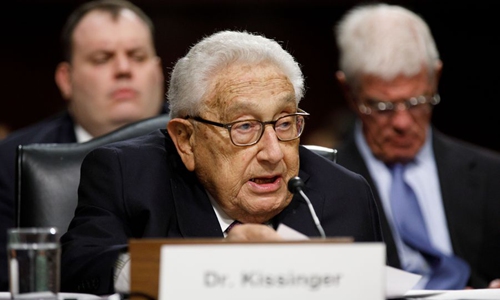
Former US Secretary of State Henry Kissinger (Front) speaks during a Senate Armed Services Committee hearing on Capitol Hill in Washington D.C., the United States, on January 25, 2018. File Photo: Xinhua
Chinese President Xi Jinping referred to former US secretary of state Henry Kissinger as a world-renowned strategist and an old friend and good friend of the Chinese people in a condolence message sent to US President Joe Biden on November 30 regarding the passing of Kissinger. Perhaps they are the most prominent ones among Kissinger's numerous labels. As stated in the message of condolence, his name will always be associated with China-US relations.
As Kissinger completes his legendary life at the age of 100, the reflections and contemplations he has brought to the world, as well as his outlook and perplexities about the future of humanity, are inseparable from China-US relations. While Kissinger's life experiences are unique and irreplicable, his thoughts, insights, and diplomatic practices constitute an immensely valuable historical legacy for China-US relationship, especially for the US. The utilization and effectiveness of this legacy by the US remain uncertain, but its existence in itself holds value and significance, waiting for future generations of the US to explore and utilize.
Kissinger's last public appearance was on October 24, when he was honored at the annual Gala Dinner of The National Committee on US-China Relations (NCUSCR) in New York City. Seated in a wheelchair, Kissinger said that "I've spent literally half of my life working on the US-China relations." He reiterated that "a peaceful relationship, a cooperative relationship between the US and China is essential for peace and progress of the world… Peace and progress between China and the US is in the self-interest of each country and of the world." This was his final public appeal. Against the backdrop of escalating tensions and growing risks of confrontation and conflicts between China and the US, Kissinger's appeal appears more like a warning.
Everyone can see that human society cannot bear the consequences of a confrontation between China and the US. However, in Washington, there is a force pushing China-US relations in this direction. With his extraordinary wisdom and calmness, Kissinger added significant weight to the rational balance of China-US relations. In July of this year, at the age of 100, Kissinger made his final visit to China. Over the past 50 years, he has shuttled between the two countries more than 100 times, playing an irreplaceable role in facilitating communication and bridging differences between China and the US. His passing is undoubtedly a tremendous loss for China-US relations. The question of whether there will be a "next Kissinger" between China and the US is also a matter of mixed emotions.
Kissinger's historic contribution to the normalization of China-US relations has been continuously demonstrated and confirmed by the astonishing achievements in the development of China-US relations. It has benefited both countries and changed the world. Even after leaving the position of secretary of state, Kissinger maintained great passion, curiosity, and sense of responsibility for international politics, especially China-US relations. He stated that he always gained new insights when visiting China and claimed to have expertise in understanding every generation of Chinese leaders. He also had a strong interest in Chinese ideology and the Chinese people. All of these have significant implications for China-US relations.
The biggest problem in current China-US relations lies in the significant deviation in Washington's perception of China. Many influential experts in US policy toward China lack interest and basic respect for Chinese history, culture and the path chosen by the Chinese people. They also fail to learn from the lessons of the early Cold War era of China-US confrontation. This leads to their inability to accurately understand and predict China's foreign behavior and consciously correct the shortsightedness in the decision-making process of US policymakers toward China. It is in this context that Kissinger's wisdom and calmness became even more prominent. By persistently advocating for China-US dialogue and actively promoting communication and exchanges between the two countries, Kissinger's influence and contributions in this regard are the best interpretation of "Kissinger's diplomatic wisdom."
Chinese people are well aware that Kissinger is first and foremost an American and a staunch defender of American interests. However, this does not prevent us from viewing him as an old friend and a good friend. Chinese people place a high value on friendship, and this title is given to him with great sincerity. At the same time, Kissinger's example also demonstrates that maintaining stable China-US relations is not contradictory to safeguarding the interests of each country. Especially in the current situation, the common interests between the two countries have not decreased, but increased. There is unlimited potential for cooperation between China and the US, and they can achieve mutual success and win-win outcomes.
President Xi expressed in his message of condolence that China is ready to work with the US to carry forward the cause of friendship between the two peoples and promote the sound and steady development of China-US relations so as to benefit the two peoples and make due contribution to world peace and development. This will be the best tribute to historical figures like Kissinger.




